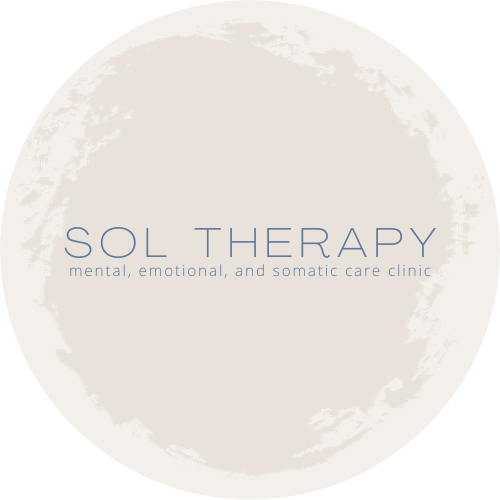Anxiety

When Anxiety Becomes Overwhelming
Anxiety can feel like being trapped in a constant state of alertness—on edge, unable to rest, and unsure why. It may show up as tension in the chest, nausea, tightness in the jaw, or racing thoughts that don’t seem to stop. Sometimes it’s linked to specific situations like social settings or travel; other times, it arises unexpectedly, without a clear cause.
For some, anxiety feels like a persistent hum beneath the surface. For others, it escalates into panic, shutdown, or emotional overwhelm. Regardless of how it appears, anxiety is not a sign of weakness—it’s the nervous system’s way of trying to protect us.
Understanding Anxiety
Anxiety isn’t just a mental or emotional experience—it’s a full-body response shaped by what we’ve lived through. From a trauma-informed perspective, anxiety is often a signal from the nervous system that something doesn’t feel safe, even when there’s no obvious threat in the present moment. This response isn’t irrational—it’s protective.
For many, anxiety takes root in environments where they had to stay alert, anticipate danger, or suppress their needs in order to stay safe or accepted. In those moments, the nervous system adapts—sometimes by becoming hyper-vigilant, other times by shutting down. Over time, these protective patterns can become deeply ingrained, showing up as racing thoughts, restlessness, avoidance, emotional overwhelm, or even panic.
When the body remembers what the mind can’t always explain, it may stay in a heightened state of alertness. These responses are not signs of weakness or dysfunction—they are survival strategies that once made sense in the context of what you lived through.
Rather than seeing anxiety as something to fix, a trauma-informed approach sees it as a form of communication. It gently invites questions like:
What has your body learned to brace for?
What does it still believe it needs to protect you from?
What parts of you haven’t felt safe enough to soften?
In therapy, we don’t force calm or push through symptoms. Instead, we work together to create the conditions where your nervous system can begin to feel safety again—at your pace, and on your terms. Through curiosity, co-regulation, and attuned support, anxiety is no longer something to fight against, but something to understand, befriend, and gently transform.
The Role of the Fight, Flight, Freeze, and Fawn Responses
When we experience anxiety—especially if shaped by past overwhelm or distress—it often connects back to the body’s instinctive survival responses. These are known as fight, flight, freeze, and fawn. They’re not choices we consciously make, but protective patterns the nervous system activates to help us survive what once felt too much, too fast, or too threatening.
Fight might show up as frustration, irritation, or a strong urge to regain control.
Flight may look like restlessness, avoidance, overworking, or difficulty being still.
Freeze can feel like numbness, shutdown, disconnection, or a sense of being “stuck.”
Fawn often appears as people-pleasing, over-accommodating, or struggling to say no.
These are not flaws. They’re intelligent adaptations that helped you stay safe. However, when the body continues to perceive threat—even in safe situations—these responses can become chronic, leading to patterns of anxiety that feel hard to shift.
Therapy supports you in understanding these patterns with compassion, and gently helps the nervous system relearn what safety can feel like—at your own pace, and without force.
Healing Through Safety, Not Force
We don’t rush to “fix” anxiety. Instead, we support you in slowing down, tuning in, and creating new internal conditions for safety. Sessions are guided gently through conversation and attuned presence, helping you reconnect with your felt sense—what your body is noticing, sensing, and holding.
Therapy is not about diving into trauma stories before you’re ready. It’s about working with your body and emotions at a pace that honors your boundaries, capacity, and timing. When safety increases, new choices naturally emerge.
Anxiety is not just something to “manage.” It’s something to understand, tend to, and integrate—especially if it’s rooted in your body’s history. With the right support, you can begin to feel more regulated, more resourced, and more yourself.
Our Services
Psychotherapy and counselling offer a safe, attuned space to explore the roots of anxiety.
Through supportive dialogue with a trained therapist, individuals can begin to understand underlying patterns, make sense of emotional responses, and build tools for navigating anxiety with greater clarity and self-trust. These approaches emphasize connection, co-regulation, and emotional safety—supporting not just symptom relief, but sustainable insight and new ways of relating to oneself with compassion and agency.
Breathwork supports the nervous system by signaling safety through slower, deeper breathing. It gently helps regulate the body’s stress response, ease tension, and bring a sense of calm. When practiced in a paced, supportive way, it invites the body out of high alert and into greater presence.
Movement Therapy complements this by engaging the body in simple, intentional movements—like shaking, swaying, or grounding exercises—that help discharge excess activation. Anxiety often lives in the body as a stored charge; these gentle movements allow it to move through and release, supporting natural regulation.
Together, breath and movement reconnect us with our body and the present moment—helping us return to ourselves with greater awareness, steadiness, and internal safety.
BCST is a gentle, hands-on therapy that supports the nervous system in settling and restoring balance. Through light, non-invasive touch, the practitioner attunes to subtle rhythms in the body—offering a safe space where deep tension, stress, and stored trauma can begin to soften and release.
Many clients experience BCST as deeply calming, especially when anxiety feels overwhelming or difficult to articulate in words. By working with the body’s innate intelligence and capacity to heal, BCST supports regulation, grounding, and a return to inner stillness.
Clinical Hypnotherapy offers a safe and guided space to access the subconscious—where many of our deep-seated beliefs, fears, and emotional patterns are held. In this calm, focused state, clients are supported to gently explore the root of their anxiety and begin to shift internal narratives that no longer serve them.
This process helps to renarrate stories shaped by past experiences, especially those formed in childhood or under stress, and opens up space for more empowering beliefs, self-understanding, and choice. Rather than using willpower alone, hypnotherapy works with the mind and body’s natural capacity to create change from within—supporting calm, clarity, and lasting transformation.
Anxiety is more than just worry—it’s often a physiological response to perceived threat, rooted in the nervous system. It can show up as racing thoughts, tension, restlessness, or a sense of overwhelm that feels hard to explain or control.
Trauma-Informed Relational Somatic Therapy offers a space to explore anxiety not just through talking, but by tuning into how it lives in the body. Through relational dialogue and felt sense awareness, this approach supports individuals in building inner safety, regulation, and connection.
Rather than pushing for change, it follows the body’s natural pace—helping clients gently notice and be with difficult sensations. This modality is especially supportive for anxiety shaped by chronic stress, attachment wounds, or trauma, guiding individuals toward deeper self-understanding, trust, and emotional steadiness.
Sol Therapy – Your Therapists for Anxiety Treatment in Singapore
For more information on our services for Anxiety Therapy in Singapore, please WhatsApp us at (65) 89422211 or email us at beinghuman@soltherapy.sg
"Courage doesn't always roar. Sometimes courage is the quiet voice at the end of the day saying, 'I will try again tomorrow'."
– Mary Anne Radmacher
